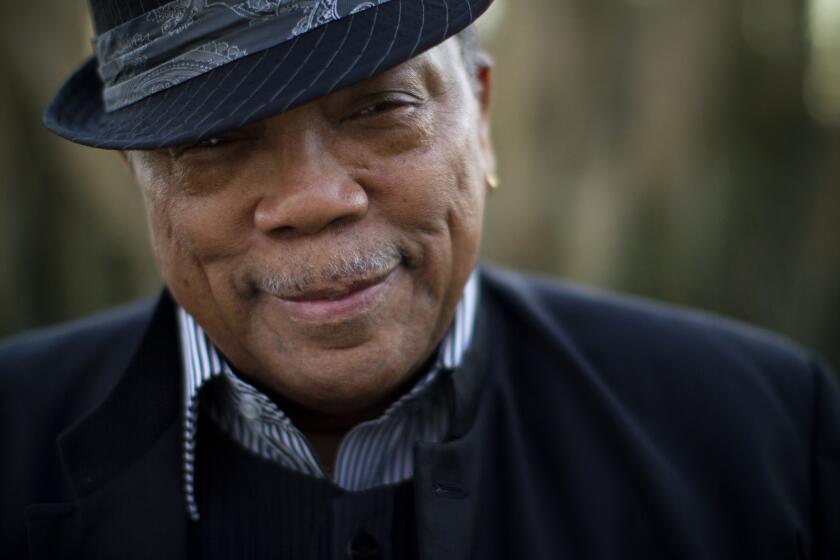Musicians oppose Pandora radio’s effort to cut payments
This post has been updated. See note below for details.
More than 100 pop, rock, R&B;, country and hip-hop musicians are protesting Pandora radio’s efforts to persuade Congress to reduce the fees the Internet radio service pays for playing their music, arguing that the measure would “gut the royalties that thousands of musicians rely upon.”
Katy Perry, Britney Spears, the Dead Kennedys, Jackson Browne, Don Henley, Cee Lo Green, the Jazz Crusaders and Ne-Yo are among 127 musicians who have signed an open letter to be published this week in Billboard that applauds Pandora for its success but criticizes its push for Congress to pass the Internet Radio Fairness Act (H.R. 6480 and S. 3609).
“We are big fans of Pandora,” the letter states. “That’s why we helped give the company a discount on rates for the past decade. Pandora is now enjoying phenomenal success as a Wall Street company. Skyrocketing growth in revenues and users. At the same time, the music community is just now beginning to gain a footing in this new digital world.
“Pandora’s principal asset is the music,” the letter continues. “Why is the company asking Congress once again to step in and gut the royalties that thousands of musicians rely upon? That’s not fair and that’s not how partners work together.”
Pandora officials have said a reduction in fees paid by Internet radio services is necessary to keep them competitive with broadcast radio. IRFA is described on Pandora’s website as “An important piece of legislation… to help end the long-standing discrimination against Internet radio.
“Today, the discrimination is extraordinary. In 2011, Pandora paid over 50% of revenues in performance royalties, while SiriusXM paid less than 10%,” according to Pandora’s statement. “Internet radio brings millions of listeners back to music, plays the songs of tens of thousands of promising working artists, enabling them to build their audience while receiving fair compensation.”
Other musicians who have lent their names to the protest effort include David Crosby, Missy Elliot, Sheryl Crow, Keyshia Cole, George Clinton, Stevie Nicks, Jason Mraz, Pink Floyd, Bonnie Raitt and the Zac Brown Band.
The musicians’ group, musicFIRST, has launched a website of its own, outlining its position. The group also has the backing of the Screen Actors Guild-American Federation of Television and Radio Artists (SAG-AFTRA), the AFL-CIO, the NAACP and the Recording Academy.
A letter from the Recording Academy opposing passage of IRFA argues that “the bill claims to create fairness but fails to address the real inequity that while Internet radio services properly pay creators, terrestrial radio pays nothing… Radio broadcasters are the only business in America that can use another’s intellectual property without permission or compensation.”
Pandora also has taken heat recently after Securities and Exchange Commission filings revealed the salaries, bonuses, stock options and other compensation for its top executives. For fiscal 2012, Chief Executive Joseph Kennedy received $732,000, Chief Marketing Officer Thomas Conrad received nearly $3.4 million and Chief Revenue Officer John Trimble was listed for total compensation of more than $4.5 million.
Update at 1:58 p.m.: The Internet Radio Fairness Coalition (IFRC) issued a statement Wednesday in response to the musicFIRST open letter: “The Internet Radio Fairness Coalition believes that we and the artists all want the same thing — a growing Internet radio industry that helps artists. The Internet Radio Fairness Act will help accomplish that goal.
“We respect the artists’ concerns and are willing to work with them through the legislative process,” the statement continued, “to create a healthy, sustainable, growing Internet radio business that benefits them as well as labels, distributors and consumers.”
An IFRC spokeswoman added: “The Internet Radio Fairness Act does not address any exact royalty rates at all. Rather, the bill would allow the Copyright Royalty Board to evaluate internet radio royalty rates under the widely used 801(b) standard instead of the current, misleadingly-named ‘willing buyer, willing seller’ rate evaluation standard. The IRFA bill does not request or make a recommendation as to what a future rate for internet radio would be.”
ALSO:
Google+ Hangout: The Monkees’ 2012 reunion tour
Jim James of My Morning Jacket to release solo album
Madonna succumbs to Psy’s ‘Gangnam Style’ in New York
Follow Randy Lewis on Twitter: @RandyLewis2
PHOTOS AND MORE:
PHOTOS: Iconic rock guitars and their owners
The Envelope: Awards Insider
PHOTOS: Unfortunately timed pop meltdowns
More to Read
The biggest entertainment stories
Get our big stories about Hollywood, film, television, music, arts, culture and more right in your inbox as soon as they publish.
You may occasionally receive promotional content from the Los Angeles Times.










